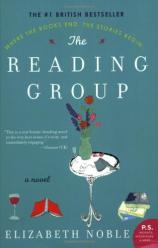Reading Group Guide
Discussion Questions
The Reading Group: A Novel

1. Consider the epigraph by Margaret Atwood: "the real, hidden subject of a book group discussion is the book members themselves." What does each member reveal by her book selection and contribution to the discussion every month? Is it possible to read a novel objectively, without filtering it through the prism of one's own life experiences?
2. As a reader, Harriet says, "I care so much more about the characters women create. And if I don't care, really care, by about page fifty, forget it." If Harriet judges a book by the emotional bonds she forms with the characters, what criteria do the other reading group members use in evaluating a good book? Consider the Harriet-led conversations on male authors, and on discerning a novel's timelessness. Do you agree with Harriet that, when reading classic literature, "you have to be able to apply what you call modern values to it and still find something relevant and pertinent in it?"
3. At the meeting to discuss The Alchemist, Harriet critiques the book saying, "I've heard the same points made more succinctly by Hallmark." As the women argue and analyze the book's relevance to their own lives, do they convince Harriet of the profundity inherent in simple truths?
4. When Polly, Susan, Harriet, and Nicole discuss Clare's infertility, what do they reveal about changing cultural attitudes toward pregnancy?
5. Compare Tim and Harriet's marriage to Jack and Polly's relationship. Are the crises that arise in each pairing similar? What happens when Tim acts on the lyrics, "If you love someone, set them free?" Does Polly do the same? How is Tim and Polly's situation different from Nicole's? How is it possible to differentiate between a love that needs to be set free, and a love that has to end?
6. Why does Susan think of motherhood as, "the steel ribbons that bind us -- Mary and Clare, me and Mum, Polly and Cressida, Cressida and her unborn baby?" How is the strength of each woman's bond tested? What does Susan mean when she says, "we're all mothers, aren't we? Different stages maybe, different problems, but the love is the same. The instinct for self-sacrifice is the same." Do you agree that motherhood is intrinsic to each stage of womanhood?
7. Why does Rob become uncomfortable and embarrassed when Tim reveals the details of his marriage? Why does he think, "It might be okay for women to talk about that stuff?" What seems to be missing from the male characters' relationships with each other? As a "man's woman" with not a "single girlfriend left from school or university," do you think Nicole was handicapped in her relationship with Gavin? How has the "feminine cocoon" of The Reading Group strengthened Nicole? Where, do you suppose, the author might stand on the nature vs. nurture debate on gender and emotional bonding?
8. How would you describe Susan's relationship with her sister Margaret? Are the ties that bind real sisters more prone to jealousy and misunderstanding of female friendship? How does the revelation of Alice's enormous act of generosity and sister-love affect Susan and Margaret?
9. When Jack picks up baby Spencer for the first time, he felt, "something instinctive, quite beyond his control." And when Spencer smiles, Jack "felt as if he'd won first prize. He wanted to make him smile again." Cressida's pregnancy seriously jeopardized her future, almost destroyed Polly's chance for marriage and love a second time around, and leaves Polly with a baby to raise during her retirement years. But in the face of these massive complications what simple, powerful truth does baby Spencer represent? Conversely, was Nicole's decision to deny the truth an act of courage or selfishness, given her changed circumstances?
10. As a member of the "sandwich generation," Susan cares for her children as well as for her Alzheimers afflicted mother. Polly raised her daughter Cressida to maturity, but now cares for her daughter's child, as well. Alice rescues her sister, and keeps her secret to her grave. Are all the women in The Reading Group caretakers, of one sort or another? Where does their unhesitating instinct for self-sacrifice come from? How does The Reading Group help the women sort through their complicated lives?
11. How does Elizabeth Noble's fictional reading group resemble your own? Has your group become more friendly over book discussions?
The Reading Group: A Novel
- Publication Date: January 4, 2005
- Paperback: 429 pages
- Publisher: William Morrow Paperbacks
- ISBN-10: 0060760443
- ISBN-13: 9780060760441








